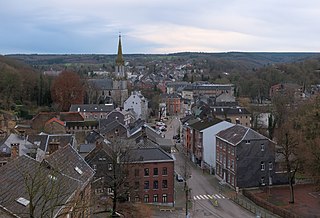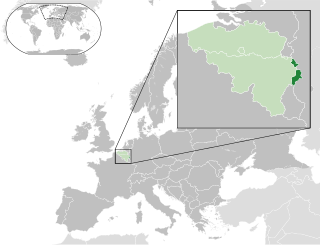The German-speaking Community of Belgium or Eastern Belgium is one of the three federal communities of Belgium. This page is an overview of its protected heritage sites, alphabetically ordered by town name.
| Town | List |
| Amel | List |
| Burg-Reuland | List |
| Büllingen | List |
| Bütgenbach | List |
| Eupen | List |
| Kelmis | List |
| Lontzen | List |
| Raeren | List |
| Sankt-Vith | List |

Belgium, officially the Kingdom of Belgium, is a country in Northwestern Europe. The country is bordered by the Netherlands to the north, Germany to the east, Luxembourg to the southeast, France to the southwest, and the North Sea to the northwest. It covers an area of 30,689 km2 (11,849 sq mi) and has a population of more than 11.5 million, making it the 22nd most densely populated country in the world and the 6th most densely populated country in Europe, with a density of 376 per square kilometre (970/sq mi). The capital and largest city is Brussels; other major cities are Antwerp, Ghent, Charleroi, Liège, Bruges, Namur, and Leuven.

Flanders is the Dutch-speaking northern portion of Belgium and one of the communities, regions and language areas of Belgium. However, there are several overlapping definitions, including ones related to culture, language, politics, and history, and sometimes involving neighbouring countries. The demonym associated with Flanders is Fleming, while the corresponding adjective is Flemish. The official capital of Flanders is the City of Brussels, although the Brussels-Capital Region has an independent regional government. The government of Flanders only oversees the community aspects of Flanders life in Brussels, such as Flemish culture and education.

The politics of Belgium take place in the framework of a federal, representative democratic, constitutional monarchy. The King of the Belgians is the head of state, and the prime minister of Belgium is the head of government, in a multi-party system. Executive power is exercised by the government. Federal legislative power is vested in both the government and the two chambers of parliament, the Senate and the Chamber of Representatives. The federation is made up of (language-based) communities and (territorial) regions. Philippe is the seventh and current King of the Belgians, having ascended the throne on 21 July 2013.

Belgium is a federal state comprising three communities and three regions that are based on four language areas. For each of these subdivision types, the subdivisions together make up the entire country; in other words, the types overlap.

Amel is a Belgian municipality in the Walloon province of Liège, and is part of the German-speaking Community of Belgium. On January 1, 2013, the municipality of Amel had a total population of 5,466. The total area is 125.15 km² which gives a population density of 44 inhabitants per km².

Burg-Reuland is a municipality located in the Belgian province of Liège. The name of the municipality refers to the castle "Burg-Reuland", which is located in the center of the community. On January 1, 2006, Burg-Reuland had a total population of 3,903. The total area is 108.96 km² which gives a population density of 36 inhabitants per km². Burg-Reuland is one of the municipalities of the German-speaking Community of Belgium.

Bütgenbach is a municipality located in the Belgian province of Liège. On January 1, 2006, Bütgenbach had a total population of 5,574. The total area is 97.31 km² which gives a population density of 57 inhabitants per km². As part of the German-speaking Community of Belgium, the official language in this municipality is German.

Eupen is the capital of East Belgium, a city and municipality in the Belgian province of Liège, 15 kilometres from the German border (Aachen), from the Dutch border (Maastricht) and from the "High Fens" nature reserve (Ardennes). The town is also the capital of the Euroregion Meuse-Rhine.

Raeren is a municipality of east Belgium located in the Walloon province of Liège. It was part of Germany until the First World War, after which it became part of Belgium. It is one of several towns in eastern Belgium which predominantly speak German.

Waimes is a municipality of Wallonia located in the province of Liège, Belgium.

The German-speaking Community, known since 2017 as East Belgium, is one of the three federal communities of Belgium. Covering an area of 854 km2 (330 sq mi) within the Liège Province in Wallonia, it includes nine of the eleven municipalities of Eupen-Malmedy. Traditionally speakers of Low Dietsch, Ripuarian, and Moselle Franconian varieties, the local population numbers 77,949 – about 7.0% of Liège Province and about 0.7% of the national total.

In Belgium, the French Community refers to one of the three constituent constitutional linguistic communities. Since 2011, the French Community has used the name Wallonia-Brussels Federation, which is controversial because its name in the Belgian constitution has not changed and because it is seen as a political statement. The name "French Community" refers to Francophone Belgians, and not to French people residing in Belgium. As such, the French Community of Belgium is sometimes rendered in English as "the French-speaking Community of Belgium" for clarity, in analogy to the German-speaking Community of Belgium.

Knokke is a town in the municipality of Knokke-Heist, which is located in the province of West Flanders in Flanders, Belgium. The town itself has 15,708 inhabitants (2007), while the municipality of Knokke-Heist has 33,818 inhabitants (2009).

The Constitution of Belgium dates back to 1831. Since then Belgium has been a parliamentary monarchy that applies the principles of ministerial responsibility for the government policy and the Trias Politica.
Industrial design rights in the European Union are provided at both the Union level by virtue of the Community design and at the national level under individual national laws.

The Brussels International Exposition of 1910 was a world's fair held in Brussels, Belgium, from 23 April to 1 November 1910. This was just thirteen years after Brussels' previous world's fair. It received 13 million visitors, covered 88 hectares and lost 100,000 Belgian Francs.

Heritage registers in Belgium include immovable heritage such as World Heritage Sites, and National heritage sites, but also intangible cultural heritage. The agency responsible for keeping and updating inventories of immovable heritage is dependent on the region, as is the name for the object, which is called Beschermd erfgoed, Biens classés or Kulturdenkmal depending on the language of the municipality of the location.
Belgian Canadians are Canadian citizens of Belgian ancestry or Belgium-born people who reside in Canada. According to the 2011 census there were 176,615 Canadians who claimed full or partial Belgian ancestry. It encompasses immigrants from both French and Dutch-speaking parts of Belgium.
The 1998 European Community Championships was a men's tennis tournament played on hard courts in Antwerp, Belgium, that was part of the Championship Series of the 1998 ATP Tour. It was the sixteenth edition of the tournament and was held 16–22 February 1998.
The 1998 European Community Championships was a men's tennis tournament played on hard courts in Antwerp, Belgium, that was part of the Championship Series of the 1998 ATP Tour. It was the sixteenth edition of the tournament and was held 16–22 February 1998.